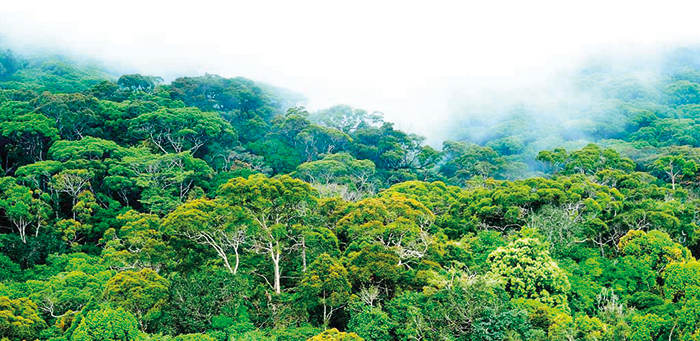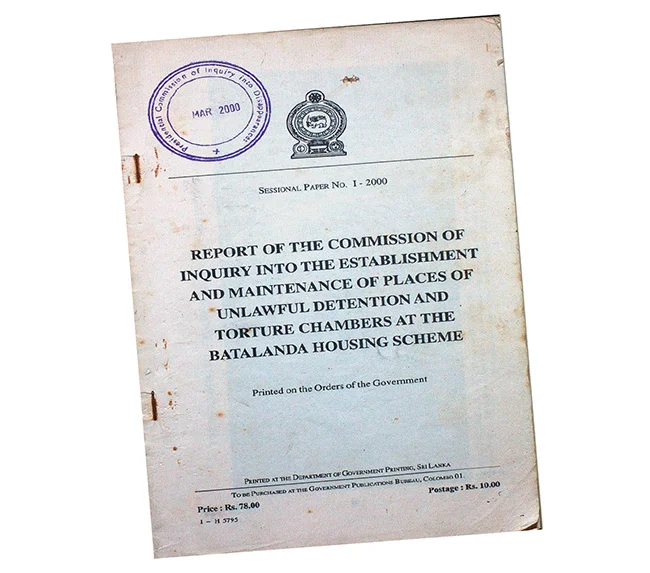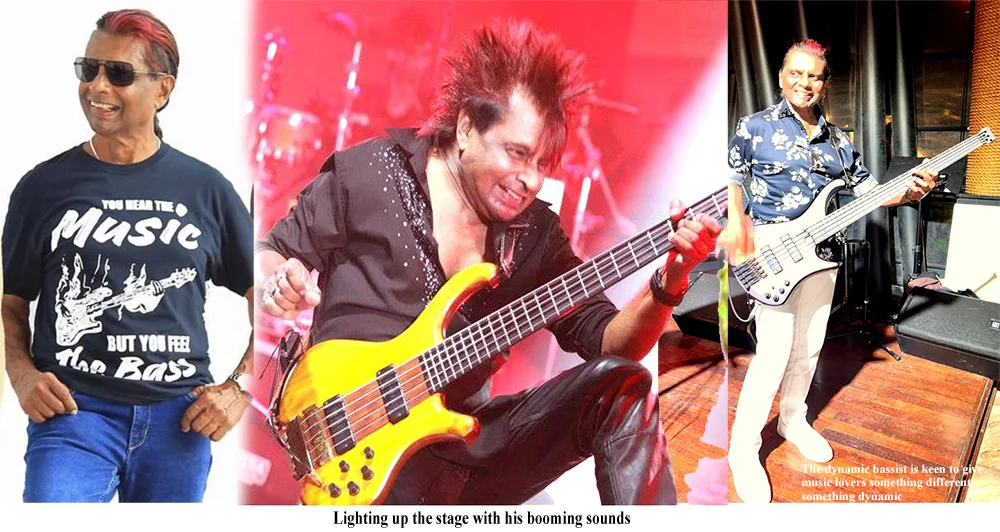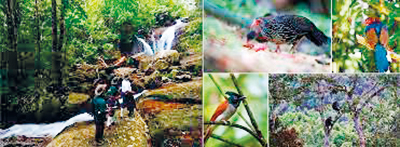Features
Tea Planter Turned Naturalist

“The forest is a peculiar organism of unlimited kindness and benevolence that makes no demands for its sustenance and extend generously the products of its activity: it affords protection to all beings, offering shade even to the axeman who destroys it. “-Gautama Buddha-
Ever since reading these words as a boy and each time thereafter, the words meant more and more to me. Hence, I felt compelled to start reading Max Morgan Davies’ book From Ceylon to Sri Lanka-experiences of a naturalist tea planter. I started from the chapter titled “Sinharaja Rainforest” which is headed by the above quotation.
What I learnt from this reading greatly enhanced what I knew of this forest reserve from visits years ago. He wrote of some politicians in the 1970s who had commenced logging operation but was mercifully stopped in the nick of time by then Prime Minister J.R. Jayewardene (who became President by an amendment to the constitution in 1978) in 1977. Recent newspaper articles indicate that another set of these vandals destroyed this national treasure by constructing a five foot wide road and clearing a part of forest for tourist hotels.
Even Wilpattu has not been spared – a motorable road runs right through the reserve. These acts indicate the ignorance of these perpetrators of a national crime which calls for all persons in a position to do so “to play a role in the ongoing effort to save Sinharaja from new intrusions which threaten its existence as a unique biosphere area declared a World Heritage Site in 1984”. This was the situation in the mid 1970s.
What is equally disturbing is the loss of the country’s forest cover excluding the reserves. In 1992 it was 2,046,599 acres (A Guide to the National Parks of Sri Lanka – Department of Wildlife Conservation). By 2008, in just 16 years, it was decreased to 1,421,954 acres (Dept of Census and Statistics – obtained ever the telephone after a great deal of persuasion!). A 30% decease. If allowed to decline at this rate, by 2070 there will be no forest cover except in the sanctuaries and that too if allowed to exist undisturbed.
The book was lent my by a friend as he presumed I would have met the author who was a planter in the upcountry for about 10 years until he left for Tanganyika in 1959 to take up the position of assistant warden of a conservation area. Although I do not recall meeting him, his name came immediately to mind as every planter of a region, if he had not met another, knew him by name as the community was small and the Planters Clubs brought them together. I remember the author was an assistant in the Ury Group in the mid 1950s when I was in charge of the Tea Research Institute’s substation at Passara.
Morgan-Davies writes practically nothing about planting per se but writes briefly about his movement up the ladder professionally. Two things that drew my attention were that within three months of employment he was able to buy a BSA 350 motorbike and about three years later a Morris Minor Tourer. That was how salaries, particularly of mercantile executives, matched the costs of goods.
Today, or even earlier, an assistant superintendent in an estate, I guess, will have to save for almost a lifetime to buy a 1,500 cc Japanese car assuming that prices and salaries move as they do now. Shows how things have changed for the worse over the last 60 years in this country when our neighbors –India, Thailand, the Maldives, Malaysia, Singapore have progressed; India particularly with a population of over a billion.
I have digressed – carried away by a great sadness for all of us who could lead better lives and haven’t even hope of doing so, as things are, even though resources were and are available in plenty.
Although Morgan – Davies lived in this country for roughly 10 years and made visits in 2002, 2004, 2005, (periods of stay not indicated), he reveals an unmistakable love for the country, its jungles, and the simple people he associated with on his shoots by himself and hunting trips with others. During these outings he gathered a great deal about the customs, habits, history folk lore etc. Of wildlife he writes extensively and with authority.
There is an entire chapter on Sardiel’s fame/notoriety commencing with his birth in 1832 and death by hanging for murder on May 7, 1864. Of his schooling the author writes “and the so-called affluent class of village boys wearing shorts…..” If Sardiel was in school at five years of age in 1837, the British dress of short trousers would not have been adopted in remote Utuwankande in just about 22 years from the signing of the Kandyan convention in 1815. According to the author, Sardiel’s criminal record began with his stealing silverware from an army officer’s dining room in Colombo where he was employed as a young man. Even before, he was guilty of pilfering brinjals from a chena close to his home and was praised and encouraged by his mother for helping her. Hence petty crimes had grown to serious criminality as time went on.
Of Ratnapura Morgan-Davies writes: “….The Kelani Valley was once not only lush tropical forest but home to extinct rhinoceros and hippopotamus and wild pig…..” Today thousands or millions of years later, Ratnapura has a New Town which looks like an abandoned town after the Law Courts finish for the day and the Old Town crowded with its architectural monstrosities of gem mudalalis’ houses and their shopping complexes.
The author writes about the Residency at Ratnapura which was until recently the official residence of the Government Agent of Sabaragamuwa and was occupied by Morgan-Davies senior in the 1940s. He mentions that the same premises were occupied by Ehelepola Maha Nilame during the rule of Sri Wickrama Rajasingha (1798-1815). My recollection of this sprawling bungalow and acres of lawn was when Mr. A.R. Ratnavale my teacher at Trinity, joined the then Ceylon Civil Service and was posted as GA, Sabaragamuwa Province. He held many other responsible positions and finally was our Ambassador to Germany.
Recollection – Law, Order, Discipline
In an advanced state of age one cannot often remember the name of a person whose face is very familiar or for that matter, sometimes, what was eaten at dinner the previous evening. A younger friend recently said that when asked for the registration number of his car, he had to take a look at it from his office window. Strangely however, some events, significant or not in school and thereafter going back decades, come readily to mind.
For instance Mr. P A Buultjens (a most outstanding cricketer in his day) claimed in his civics class in Form II in Trinity College that all man needs to live well were food, clothing and shelter. When then did education, health care, transport and other needs like security, human rights, entertainment come to be added to the list?
Some 40-odd years ago and before, parents could find places in schools of their choice for their children without scheming, planning teaching the little mites to lie before they could even pronounce their names properly. Every district had a government hospital, several government dispensaries and maternity homes. Every patient, whether rich or poor, was treated free of charge; quality medicines included.
If privacy was desired, hospital wards had cubicles and rooms with a variation in diet for which charges were levied. Plenty of medical practitioners were in the health service – competent, patient and caring. In those times there may have been just one or two private nursing homes in addition to such as the Joseph Frazer and Hatton Nursing Home, both managed by Trusts for the benefit of non-nationals living in the country.
The Ceylon Government Railway and many private bus companies provided the people’s needs of public transport. Hiring cars with distinguishing number plates of numerals in red catered to the richer passenger. In the eastern coastal areas and Jaffna, ferries conveyed passengers, vehicles and domestic animals across lagoons, rivers and shallows seas for nominal fees.
In Kandy the M Henry Bus Company operated within the town and its suburbs – Peradeniya, Katugastota, Ampitiya and Tennekumbura. The Silver Line Bus Company covered the Matale and Mahiyangana areas while the Madhyama Lanka Company served the upper Hill Country. These were well managed, buses ran to set timetables, passengers were issued tickets and given the correct change and treated like valued customers.
The Associated Newspapers of Ceylon Ltd transported its newspapers, with a limited number of passengers, in buses to the outstations leaving Lake House late at night carrying the day’s papers. The one and only incident connected with bus travel which I was subjected to and will never forget occurred in one of those buses to Kandy from Colombo. The bus was cruising at a steady 30 mph close to Nittambuwa, almost the whole road all to itself, hoodlights off, some passengers fast asleep, others dozing when suddenly a blood curdling yell came from a passenger in the middle of the bus.
The driver in his excitement or fear virtually stood on the brake pedal bringing the vehicle to a violent shuddering halt in the middle of the road throwing the half awake or sleeping passengers over their seats, under the seats and all over the narrow aisle. Some tried to squeeze themselves out when another full throated yell-Budhu Ammo, kava kava came from another direction. There was utter chaos with passengers searching frantically for physical injuries when at last the driver and conductor took charge of the situation bringing some order.
The two whose shouts caused all the mayhem were identified, questioned and the reptile they said bit them searched for. Soon a crab was found, then another and then a brown palm leaf bag with its mouth slightly open with crabs inside. The conductor, driver and bite victims and angry passengers were ready to draw blood and demanded the owner come forward. None did. Similar to the proceedings at an auction, the conductor called three times, but since no one was willing to face such a hostile crowd, he announced he would take the creatures home since his lamainge amma knew how to make a good crab curry to go with an arracku baage.
Barring such infrequent misadventures, bus and train travel in those days were uneventful with few complaints from passengers about overcrowding, delays, rudeness, being short-changed or pickpocketed. The situation now unfortunately is that almost daily we read of buses plunging down precipices due to mechanical failure in the bus or drunk driving; collisions with other vehicles or maiming or killing pedestrians; or if nothing else, work stoppages by bus crews when Traffic Police carry out their duties.
Accounts of train derailments, closure of whole sections of lines at short notice, ramming vehicles at unprotected level crossings for lack of even a bamboo across the road are common. Though rarely reported in newspapers, railway passengers complain of delays, dirty compartments, stench from toilets. Reading while travelling in a train is impractical due to severe jerks and conversation impossible due to the ear splitting noise of the running train- both due to years of neglect of tracks and trains.
Back to basics and attention to detail will correct these shortcomings which are comparatively inexpensive development projects which have far reaching benefits for almost everyone in the country who deserve better. We stretch out to tourists and build more and more accommodation for them. They too want a good public transport system to travel around at reasonable cost. A well coordinated road/rail service would be of immense benefit to locals and foreigners.
Why have standards of practically all services to the people of this country who contribute in one way or another to prop them up and pay their employees, declined so drastically over the last 50 odd years? I quote from a recent editorial in the Sunday Island to provide part of the answer. “By and large management of the state sector rather than the profit driven private sector proved less efficient and widened the field for political leadership to extend patronage to their supporters.
” Undoubtedly, private sector high-ups too did help their friends and relatives in companies they controlled but seldom at the expense of profit! It is well known that getting employment in the private sector was far easier than keeping the job. Efficiency, loyalty, excellent conduct were all a must if one was not to be the recipient of the dreaded pink slip.
To amplify that quote it could be added that discipline in its fullest sense in the national work force has broken down to alarming levels in the public sector and to a lesser degree in the private sector as well, in the last four or five decades. Those who should set examples are the large numbers of politicians we have. They could be the first to be placed in the dock. Many of these the country has produced since Independence are to be blamed, considering the influence on the people of this country they wield through their positions in society.
They fight tooth and nail, murder and injure their opponents and their supporters to ‘serve the people’ through Parliament, 18 Municipal Councils, 42 Urban Councils, 270 Pradeshiya Sabhas and the newer Provincial Councils. At the end of their period of office how many can truly claim to have made worthwhile contributions towards the improvement of any aspect of their voters lives.
In many instances of course, it is evident that they themselves acquired a great deal in terms of wealth in its many manifestations – girth around the middle being the most obvious and the absence of declarations of wealth or income tax returns. Reading a list of the obnoxious actions of some of these can spoil a good Sunday morning; hence suffice it say therefore they lack totally a sense of commitment and above all honour.
However, they carry on regardless and apparently thrive. So what better example for impressionable people, particularly the young? The shortest route to this kind of good life is first to tag onto a crooked politicians, then don a lily white national costume or the kapati kit, display a couple of gold rings, bracelets, an expensive mobile phone and talk with assumed authority on every conceivable topic – a lot of with promises thrown in which even they cannot dream of delivering.
A cabinet minister of several years ago, when the rot was being recognized and talked of said the cure was a little bit of totalitarian governance. Some agreed while others felt chills running down their spies. That government soon found itself in a sagrayak meda. Fortunately all is not finally lost. This country is blessed with decent, intelligent and sincere men and women in all walks of life and out of the political merry-go-round. They outnumber the scum but are as yet hardly audible and of course not listened to nor taken notice of by the swollen heads in power.
Features
Inescapable need to deal with the past

The sudden reemergence of two major incidents from the past, that had become peripheral to the concerns of people today, has jolted the national polity and come to its centre stage. These are the interview by former president Ranil Wickremesinghe with the Al Jazeera television station that elicited the Batalanda issue and now the sanctioning of three former military commanders of the Sri Lankan armed forces and an LTTE commander, who switched sides and joined the government. The key lesson that these two incidents give is that allegations of mass crimes, whether they arise nationally or internationally, have to be dealt with at some time or the other. If they are not, they continue to fester beneath the surface until they rise again in a most unexpected way and when they may be more difficult to deal with.
In the case of the Batalanda interrogation site, the sudden reemergence of issues that seemed buried in the past has given rise to conjecture. The Batalanda issue, which goes back 37 years, was never totally off the radar. But after the last of the commission reports of the JVP period had been published over two decades ago, this matter was no longer at the forefront of public consciousness. Most of those in the younger generations who were too young to know what happened at that time, or born afterwards, would scarcely have any idea of what happened at Batalanda. But once the issue of human rights violations surfaced on Al Jazeera television they have come to occupy centre stage. From the day the former president gave his fateful interview there are commentaries on it both in the mainstream media and on social media.
There seems to be a sustained effort to keep the issue alive. The issues of Batalanda provide good fodder to politicians who are campaigning for election at the forthcoming Local Government elections on May 6. It is notable that the publicity on what transpired at Batalanda provides a way in which the outcome of the forthcoming local government elections in the worst affected parts of the country may be swayed. The problem is that the main contesting political parties are liable to be accused of participation in the JVP insurrection or its suppression or both. This may account for the widening of the scope of the allegations to include other sites such as Matale.
POLITICAL IMPERATIVES
The emergence at this time of the human rights violations and war crimes that took place during the LTTE war have their own political reasons, though these are external. The pursuit of truth and accountability must be universal and free from political motivations. Justice cannot be applied selectively. While human rights violations and war crimes call for universal standards that are applicable to all including those being committed at this time in Gaza and Ukraine, political imperatives influence what is surfaced. The sanctioning of the four military commanders by the UK government has been justified by the UK government minister concerned as being the fulfilment of an election pledge that he had made to his constituents. It is notable that the countries at the forefront of justice for Sri Lanka have large Tamil Diasporas that act as vote banks. It usually takes long time to prosecute human rights violations internationally whether it be in South America or East Timor and diasporas have the staying power and resources to keep going on.
In its response to the sanctions placed on the military commanders, the government’s position is that such unilateral decisions by foreign government are not helpful and complicate the task of national reconciliation. It has faced criticism for its restrained response, with some expecting a more forceful rebuttal against the international community. However, the NPP government is not the first to have had to face such problems. The sanctioning of military commanders and even of former presidents has taken place during the periods of previous governments. One of the former commanders who has been sanctioned by the UK government at this time was also sanctioned by the US government in 2020. This was followed by the Canadian government which sanctioned two former presidents in 2023. Neither of the two governments in power at that time took visibly stronger stands.
In addition, resolutions on Sri Lanka have been a regular occurrence and have been passed over the Sri Lankan government’s opposition since 2012. Apart from the very first vote that took place in 2009 when the government promised to take necessary action to deal with the human rights violations of the past, and won that vote, the government has lost every succeeding vote with the margins of defeat becoming bigger and bigger. This process has now culminated in an evidence gathering unit being set up in Geneva to collect evidence of human rights violations in Sri Lanka that is on offer to international governments to use. This is not a safe situation for Sri Lankan leaders to be in as they can be taken before international courts in foreign countries. It is important for Sri Lanka’s sovereignty and dignity as a country that this trend comes to an end.
COMPREHENSIVE SOLUTION
A peaceful future for Sri Lanka requires a multi-dimensional approach that addresses the root causes of conflict while fostering reconciliation, justice, and inclusive development. So far the government’s response to the international pressures is to indicate that it will strengthen the internal mechanisms already in place like the Office on Missing Persons and in addition to set up a truth and reconciliation commission. The difficulty that the government will face is to obtain a national consensus behind this truth and reconciliation commission. Tamil parties and victims’ groups in particular have voiced scepticism about the value of this mechanism. They have seen commissions come and commissions go. Sinhalese nationalist parties are also highly critical of the need for such commissions. As the Nawaz Commission appointed to identify the recommendations of previous commissions observed, “Our island nation has had a surfeit of commissions. Many witnesses who testified before this commission narrated their disappointment of going before previous commissions and achieving nothing in return.”
Former minister Prof G L Peiris has written a detailed critique of the proposed truth and reconciliation law that the previous government prepared but did not present to parliament.
In his critique, Prof Peiris had drawn from the South African truth and reconciliation commission which is the best known and most thoroughly implemented one in the world. He points out that the South African commission had a mandate to cover the entire country and not only some parts of it like the Sri Lankan law proposes. The need for a Sri Lankan truth and reconciliation commission to cover the entire country and not only the north and east is clear in the reemergence of the Batalanda issue. Serious human rights violations have occurred in all parts of the country, and to those from all ethnic and religious communities, and not only in the north and east.
Dealing with the past can only be successful in the context of a “system change” in which there is mutual agreement about the future. The longer this is delayed, the more scepticism will grow among victims and the broader public about the government’s commitment to a solution. The important feature of the South African commission was that it was part of a larger political process aimed to build national consensus through a long and strenuous process of consultations. The ultimate goal of the South African reconciliation process was a comprehensive political settlement that included power-sharing between racial groups and accountability measures that facilitated healing for all sides. If Sri Lanka is to achieve genuine reconciliation, it is necessary to learn from these experiences and take decisive steps to address past injustices in a manner that fosters lasting national unity. A peaceful Sri Lanka is possible if the government, opposition and people commit to truth, justice and inclusivity.
by Jehan Perera
Features
Unleashing Minds: From oppression to liberation

 Education should be genuinely ‘free’—not just in the sense of being free from privatisation, but also in a way that empowers students by freeing them from oppressive structures. It should provide them with the knowledge and tools necessary to think critically, question the status quo, and ultimately liberate themselves from oppressive systems.
Education should be genuinely ‘free’—not just in the sense of being free from privatisation, but also in a way that empowers students by freeing them from oppressive structures. It should provide them with the knowledge and tools necessary to think critically, question the status quo, and ultimately liberate themselves from oppressive systems.
Education as an oppressive structure
Education should empower students to think critically, challenge oppression, and envision a more just and equal world. However, in its current state, education often operates as a mechanism of oppression rather than liberation. Instead of fostering independent thinking and change, the education system tends to reinforce the existing power dynamics and social hierarchies. It often upholds the status quo by teaching conformity and compliance rather than critical inquiry and transformation. This results in the reproduction of various inequalities, including economic, racial, and social disparities, further entrenching divisions within society. As a result, instead of being a force for personal and societal empowerment, education inadvertently perpetuates the very systems that contribute to injustice and inequality.
Education sustaining the class structure
Due to the widespread privatisation of education, the system continues to reinforce and sustain existing class structures. Private tuition centres, private schools, and institutions offering degree programmes for a fee all play a significant role in deepening the disparities between different social classes. These private entities often cater to the more affluent segments of society, granting them access to superior education and resources. In contrast, students from less privileged backgrounds are left with fewer opportunities and limited access to quality education, exacerbating the divide between the wealthy and the underprivileged. This growing gap in educational access not only limits social mobility but also perpetuates a cycle where the privileged continue to secure better opportunities while the less fortunate struggle to break free from the constraints of their socio-economic status.
Gender Oppression
Education subtly perpetuates gender oppression in society by reinforcing stereotypes, promoting gender insensitivity, and failing to create a gender-sensitive education system. And some of the policymakers do perpetuate this gender insensitive education by misinforming people. In a recent press conference, one of the former members of Parliament, Wimal Weerawansa, accused gender studies of spreading a ‘disease’ among students. In the year 2025, we are still hearing such absurdities discouraging gender studies. It is troubling and perplexing to hear such outdated and regressive views being voiced by public figures, particularly at a time when societies, worldwide, are increasingly embracing diversity and inclusion. These comments not only undermine the importance of gender studies as an academic field but also reinforce harmful stereotypes that marginalise individuals who do not fit into traditional gender roles. As we move forward in an era of greater social progress, such antiquated views only serve to hinder the ongoing work of fostering equality and understanding for all people, regardless of gender identity.
Students, whether in schools or universities, are often immersed in an educational discourse where gender is treated as something external, rather than an essential aspect of their everyday lives. In this framework, gender is framed as a concern primarily for “non-males,” which marginalises the broader societal impact of gender issues. This perspective fails to recognise that gender dynamics affect everyone, regardless of their gender identity, and that understanding and addressing gender inequality is crucial for all individuals in society.
A poignant example of this issue can be seen in the recent troubling case of sexual abuse involving a medical doctor. The public discussion surrounding the incident, particularly the media’s decision to disclose the victim’s confidential statement, is deeply concerning. This lack of respect for privacy and sensitivity highlights the pervasive disregard for gender issues in society.
What makes this situation even more alarming is that such media behaviour is not an isolated incident, but rather reflects a broader pattern in a society where gender sensitivity is often dismissed or ignored. In many circles, advocating for gender equality and sensitivity is stigmatised, and is even seen as a ‘disease’ or a disruptive force to the status quo. This attitude contributes to a culture where harmful gender stereotypes persist, and where important conversations about gender equity are sidelined or distorted. Ultimately, this reflects the deeper societal need for an education system that is more attuned to gender sensitivity, recognising its critical role in shaping the world students will inherit and navigate.
To break free from these gender hierarchies there should be, among other things, a gender sensitive education system, which does not limit gender studies to a semester or a mere subject.
Ragging
The inequality that persists in class and regional power structures (Colombo and non-Colombo division) creeps into universities. While ragging is popularly seen as an act of integrating freshers into the system, its roots lie in the deeply divided class and ethno-religious divisions within society.
In certain faculties, senior students may ask junior female students to wear certain fabrics typically worn at home (cheetta dresses) and braid their hair into two plaits, while male students are required to wear white, long-sleeved shirts without belts. Both men and women must wear bathroom slippers. These actions are framed as efforts to make everyone equal, free from class divisions. However, these gendered and ethicised practices stem from unequal and oppressive class structures in society and are gradually infiltrating university culture as mechanisms of oppression.The inequality that persists in gradually makes its way into academic institutions, particularly universities.
These practices are ostensibly intended to create a sense of uniformity and equality among students, removing visible markers of class distinction. However, what is overlooked is that these actions stem from deeply ingrained and unequal social structures that are inherently oppressive. Instead of fostering equality, they reinforce a system where hierarchical power dynamics in the society—rooted in class, gender, and region—are confronted with oppression and violence which is embedded in ragging, creating another system of oppression.
Uncritical Students
In Sri Lanka, and in many other countries across the region, it is common for university students to address their lecturers as ‘Sir’ and ‘Madam.’ This practice is not just a matter of politeness, but rather a reflection of deeply ingrained societal norms that date back to the feudal and colonial eras. The use of these titles reinforces a hierarchical structure within the educational system, where authority is unquestioned, and students are expected to show deference to their professors.
Historically, during colonial rule, the education system was structured around European models, which often emphasised rigid social distinctions and the authority of those in power. The titles ‘Sir’ and ‘Madam’ served to uphold this structure, positioning lecturers as figures of authority who were to be respected and rarely challenged. Even after the end of colonial rule, these practices continued to permeate the education system, becoming normalised as part of the culture.
This practice perpetuates a culture of obedience and respect for authority that discourages critical thinking and active questioning. In this context, students are conditioned to see their lecturers as figures of unquestionable authority, discouraging dialogue, dissent, or challenging the status quo. This hierarchical dynamic can limit intellectual growth and discourage students from engaging in open, critical discussions that could lead to progressive change within both academia and society at large.
Unleashing minds
The transformation of these structures lies in the hands of multiple parties, including academics, students, society, and policymakers. Policymakers must create and enforce policies that discourage the privatisation of education, ensure equal access for all students, regardless of class dynamics, gender, etc. Education should be regarded as a fundamental right, not a privilege available only to a select few. Such policies should also actively promote gender equality and inclusivity, addressing the barriers that prevent women, LGBTQ+ individuals, and other marginalised genders from accessing and succeeding in education. Practices that perpetuate gender inequality, such as sexism, discrimination, or gender-based violence, need to be addressed head-on. Institutions must prioritise gender studies and sensitivity training to cultivate an environment of respect and understanding, where all students, regardless of gender, feel safe and valued.
At the same time, the micro-ecosystems of hierarchy within institutions—such as maintaining outdated power structures and social divisions—must be thoroughly examined and challenged. Universities must foster environments where critical thinking, mutual respect, and inclusivity—across both class and gender—are prioritised. By creating spaces where all minds can flourish, free from the constraints of entrenched hierarchies, we can build a more equitable and intellectually vibrant educational system—one that truly unleashes the potential of all students, regardless of their social background.
(Anushka Kahandagamage is the General Secretary of the Colombo Institute for Human Sciences)
Kuppi is a politics and pedagogy happening on the margins of the lecture hall that parodies, subverts, and simultaneously reaffirms social hierarchies.
By Anushka Kahandagamage
Features
New vision for bassist Benjy

It’s a known fact that whenever bassist Benjy Ranabahu booms into action he literally lights up the stage, and the exciting news I have for music lovers, this week, is that Benjy is coming up with a new vision.
One thought that this exciting bassist may give the music scene a layoff, after his return from the Seychelles early this year.
At that point in time, he indicated to us that he hasn’t quit the music scene, but that he would like to take a break from the showbiz setup.
“I’m taking things easy at the moment…just need to relax and then decide what my future plans would be,” he said.
However, the good news is that Benjy’s future plans would materialise sooner than one thought.
Yes, Benjy is putting together his own band, with a vision to give music lovers something different, something dynamic.
He has already got the lineup to do the needful, he says, and the guys are now working on their repertoire.
The five-piece lineup will include lead, rhythm, bass, keyboards and drums and the plus factor, said Benjy, is that they all sing.
A female vocalist has also been added to this setup, said Benjy.
“She is relatively new to the scene, but with a trained voice, and that means we have something new to offer music lovers.”
The setup met last week and had a frank discussion on how they intend taking on the music scene and everyone seems excited to get on stage and do the needful, Benjy added.
Benjy went on to say that they are now spending their time rehearsing as they are very keen to gel as a team, because their skills and personalities fit together well.
“The guys I’ve got are all extremely talented and skillful in their profession and they have been around for quite a while, performing as professionals, both here and abroad.”
Benjy himself has performed with several top bands in the past and also had his own band – Aquarius.
Aquarius had quite a few foreign contracts, as well, performing in Europe and in the Middle East, and Benjy is now ready to do it again!
-

 Sports3 days ago
Sports3 days agoSri Lanka’s eternal search for the elusive all-rounder
-

 Features7 days ago
Features7 days agoCelebrating 25 Years of Excellence: The Silver Jubilee of SLIIT – PART I
-

 News4 days ago
News4 days agoGnanasara Thera urged to reveal masterminds behind Easter Sunday terror attacks
-

 Business7 days ago
Business7 days agoCEB calls for proposals to develop two 50MW wind farm facilities in Mullikulam
-

 Business5 days ago
Business5 days agoAIA Higher Education Scholarships Programme celebrating 30-year journey
-

 Features7 days ago
Features7 days agoNotes from AKD’s Textbook
-

 News2 days ago
News2 days agoBid to include genocide allegation against Sri Lanka in Canada’s school curriculum thwarted
-

 News3 days ago
News3 days agoComBank crowned Global Finance Best SME Bank in Sri Lanka for 3rd successive year












